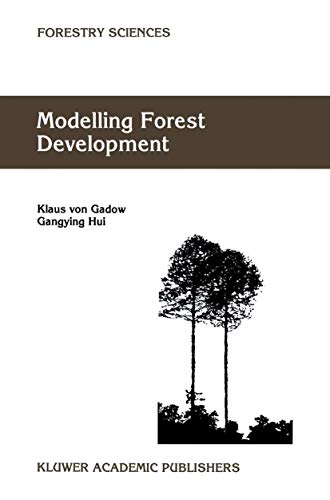Items related to Modelling Forest Development (Forestry Sciences, 57)

"synopsis" may belong to another edition of this title.
- PublisherSpringer
- Publication date2001
- ISBN 10 1402002769
- ISBN 13 9781402002762
- BindingPaperback
- Number of pages222
Buy New
Learn more about this copy
Shipping:
US$ 3.99
Within U.S.A.
Top Search Results from the AbeBooks Marketplace
Modelling Forest Development (Forestry Sciences, 57)
Book Description Condition: New. Seller Inventory # ABLIING23Mar2411530140912
Modelling Forest Development
Book Description Condition: New. PRINT ON DEMAND Book; New; Fast Shipping from the UK. No. book. Seller Inventory # ria9781402002762_lsuk
Modelling Forest Development
Book Description Taschenbuch. Condition: Neu. This item is printed on demand - it takes 3-4 days longer - Neuware -In an lUlffianaged woodland, forest development follows a succession of periods of undisturbed natural growth, interrupted by intermediate loss or damage of trees caused by fire or wind or other natural hazards. In a managed woodland, the most important periodic disturbances are the thinning operations, which are often carried out at regular intervals and which usually have a significant effect on the future evolution of the resource. Thus, a realistic model of forest development includes both natural growth and thinnings. The key to successful timber management is a proper understanding of growth processes, and one of the objectives of modelling forest development is to provide the tools that enable foresters to compare alternative silvicultural treatments. Foresters need to be able to anticipate the consequences of a particular thinning operation. In most cases, total timber volume is not a very appropriate measure for quantifying growth or yields, or changes caused by thinning operations. Yield in economic terms is defined by the dimensions and quality attributes of the harvestable logs, and estimating timber products is a central issue of production-oriented growth and yield research. Introduction 2 Growth modelling is also an essential prerequisite for evaluating the consequences of a particular management action on the future development of an important natural resource, such as a woodland ecosystem. 232 pp. Englisch. Seller Inventory # 9781402002762
Modelling Forest Development
Book Description Paperback / softback. Condition: New. This item is printed on demand. New copy - Usually dispatched within 5-9 working days. Seller Inventory # C9781402002762
Modelling Forest Development
Book Description Taschenbuch. Condition: Neu. Druck auf Anfrage Neuware - Printed after ordering - In an lUlffianaged woodland, forest development follows a succession of periods of undisturbed natural growth, interrupted by intermediate loss or damage of trees caused by fire or wind or other natural hazards. In a managed woodland, the most important periodic disturbances are the thinning operations, which are often carried out at regular intervals and which usually have a significant effect on the future evolution of the resource. Thus, a realistic model of forest development includes both natural growth and thinnings. The key to successful timber management is a proper understanding of growth processes, and one of the objectives of modelling forest development is to provide the tools that enable foresters to compare alternative silvicultural treatments. Foresters need to be able to anticipate the consequences of a particular thinning operation. In most cases, total timber volume is not a very appropriate measure for quantifying growth or yields, or changes caused by thinning operations. Yield in economic terms is defined by the dimensions and quality attributes of the harvestable logs, and estimating timber products is a central issue of production-oriented growth and yield research. Introduction 2 Growth modelling is also an essential prerequisite for evaluating the consequences of a particular management action on the future development of an important natural resource, such as a woodland ecosystem. Seller Inventory # 9781402002762
Modelling Forest Development
Book Description Condition: New. Dieser Artikel ist ein Print on Demand Artikel und wird nach Ihrer Bestellung fuer Sie gedruckt. In an lUlffianaged woodland, forest development follows a succession of periods of undisturbed natural growth, interrupted by intermediate loss or damage of trees caused by fire or wind or other natural hazards. In a managed woodland, the most important per. Seller Inventory # 4091720

